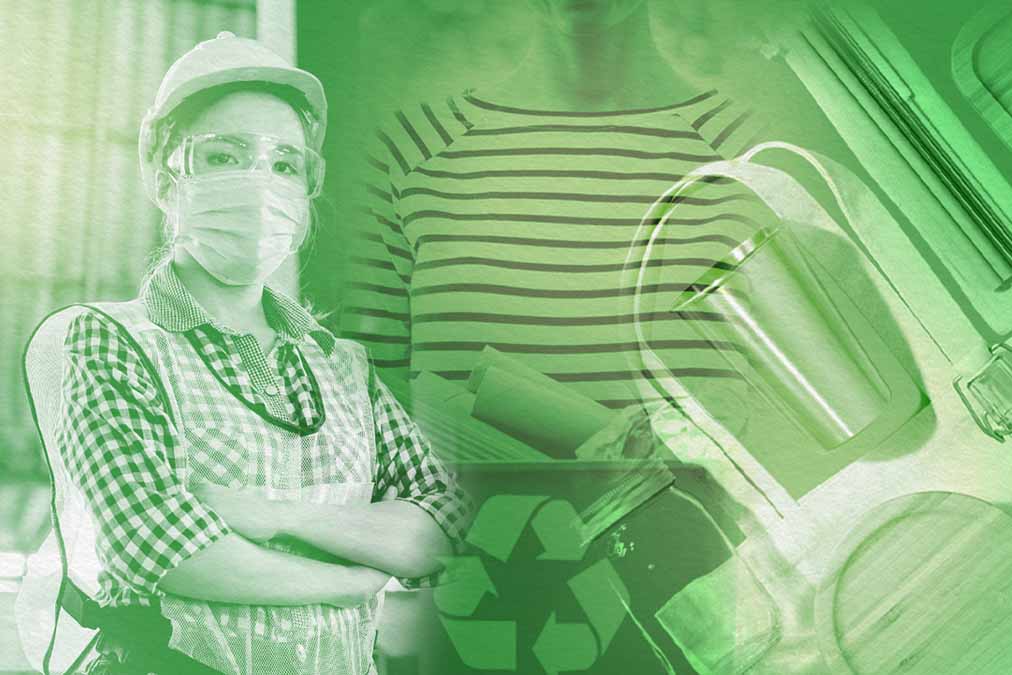
A warm welcome back to “Women in Circularity,” where we shine a light on women moving us toward a circular economy. This month, I connected with a sustainability professional who specializes in zero waste business practices: Celeste McMickle. Celeste is a director of client solutions at GBCI, a nonprofit organization that independently recognizes excellence in green business industry performance globally, through certification and credentialing services. She has 17 years of experience in sustainable materials management.
Celeste McMickle
How has your career grown and changed throughout the years?
Substantially! I started my professional career in architecture, which is also my academic background. I heard about LEED certification and green building while I was in architecture school and got involved in the industry when I was working as a designer. I found I was more interested in the sustainability side of buildings than the design side, so I became a full-time green building consultant. In this role, I became more familiar with construction techniques and specifically waste management. This led me to get more involved in local recycling policy through various roles at the New York City Department of Sanitation and the NYC Compost Project. Now I have really come full circle as I am back to my original roots working with the USGBC/GBCI but with our zero waste certification and credentialing program, TRUE. It has been a wild ride!
What are some of the positive business outcomes that result from your zero waste efforts?
I think the most rewarding aspect of my work with TRUE is that I can offer my clients both a flexible framework and a roadmap for their zero waste journey. When I speak with prospective clients that have a goal to achieve zero waste but are lacking the compass, I know I can help them get there. What TRUE has created is a straightforward tool that helps companies map out their journey to zero waste while also evaluating their material commodities as valuable resources. It is inspiring to witness the ‘lightbulb moment’ – when people recognize how to use our resources as goal posts that make their achievements possible.
Can you tell us about a recent project that was particularly memorable for you?
I have been encouraged by the substantial movement in the sports stadium and arena sector over the last year. Large-scale public events such as sports are notoriously wasteful (think of all that food and beverage packaging) and we have seen a lot of leadership in this sector to change their ways. State Farm and Mercedes-Benz stadiums, especially, have helped paved the way for others through their recent achievements and I think we are well positioned to see even more sector growth in the future.
What are some of the factors that are motivating companies to ramp up their circularity efforts, in your estimation?
I think as a society we are collectively arriving at the conclusion that ‘business as usual’ just is not cutting it anymore. The need to reshape our economy is moving from a ‘should we’ proposition to a ‘how to’ one. These cries for change are no longer coming from just environmental activists, but from people of all backgrounds and the good news is that we have a ton of solutions. From a very clear financial perspective it just makes sense to have a better grasp on material and resource management. Reuse, redesign, reduction and recycling all represent huge opportunities for economic and job growth – alongside all the social and environmental benefits. I think the circular economy is particularly exciting because the materials we use every day are the tangible aspects of the economy that consumers can relate to and they want to feel like they are part of the solution. Companies are responding to all of this and it’s coming with a great deal of growth and change.
Is there a documentary you have found particularly uplifting and would like to recommend to others?
One industry-specific documentary I find interesting is “Microplastic Madness.” It is both uplifting and informative as it follows the journey of children’s activism and education surrounding the plastics issue and has some great lessons and takeaways for how to make a difference in your community. I also really love watching heartfelt nature and wildlife documentaries because this connects me back to what I love the most and why I do the work I do in this world.
MaryEllen Etienne is the creator of “Women in Circularity.” Etienne works on the Market Transformation and Development team for the U.S. Green Building Council. She has over 20 years of experience in sustainability and is a champion of the circular economy.
More from the “Women in Circularity” series
- Women in Circularity: Teresa Bradley
- Women in Circularity: Sue Beets-Atkinson
- Women in Circularity: Beth Forsberg